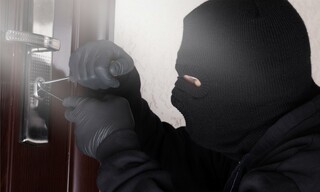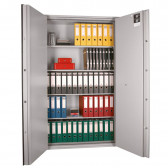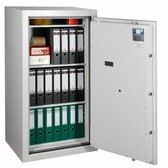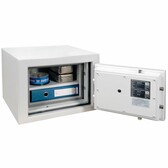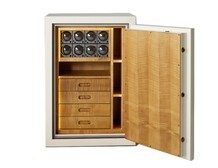A safe is a device designed to protect valuable items and data from unauthorised persons. Unfortunately, not everyone knows that the more valuable the items, the higher the security class of the safe must be. If, after a theft, it turns out that the security of your safe was too weak, you will not be fully compensated by your insurer. From this article you will find out what class of safe you need to effectively protect your possessions.
What are the security classes of safes?
The security classes of safes are as follows (from the lowest class): S1, S2, 0, I, II, III, IV, V, VI, VII, VIII. The safety classes of safes are defined by three standards:
● PN-EN 14450,
● PN-EN 1143-1,
● PN-EN 1143-2.
In accordance with these standards, each class is assigned a calculation unit, on the basis of which the value of the items which may be stored in the safe of the respective class is calculated.
One unit of account is 120 times the average gross monthly salary for the last quarter in Poland. As you know, salaries are constantly increasing, so the unit of account is constantly changing. You can increase the safe's capacity for assigned calculation units by improving the security. This can be done, for example, by:
● using an audible alarm,
● installing a burglar alarm system,
● installing a camera system to monitor the safe.
The following table shows the calculation units assigned to safes:
class | S1 | S2 | 0 | I | II | III |
|---|---|---|---|---|---|---|
value | 0,1 unit | 0,2 u | 0,5 u | 1 u | 1,5 u | 3 u |
IV | V | VI | VII | VIII |
|---|---|---|---|---|
5 u | 8 u | 12 u | 16 u | 20 u |
If you want to calculate how much safe you will need, you need to perform a simple mathematical operation. Currently, the average gross salary is just over 5000 PLN. For the purpose of calculations you can assume that it will be exactly 5000 zlotys.
In accordance with the above assumptions, the stored value limit for a class I safe is:
1 unit × 120 × 5000 = 600 000 PLN.
If you want to calculate exactly which safe you need, first assess the value of the items you want to keep there. Then divide the value of your goods by 5000. Divide the resulting value by 120 and you will get the calculation unit for the safe of a specific class.
For example, you would like to keep 1.000.000 zlotys in your safe. Thus, the calculation of the class of the safe is:
1.000.000 ÷ 5000 ÷ 120 = 1,6(6) u.
A class two safe only has 1.5 u, so you need a class three safe which has 3 units. By doing this, it is very easy to assess which safe you will need in the future. You may one day want to keep more valuable items or more cash in there.
The above calculations are estimates and must be verified by your insurance company. Insurance companies may apply additional calculations for the value of items that you can deposit in a safe.
Find out: What class should a gun safe have? Regulations vs. reality
Which safe for home and which for business?
You can use the same armoured cabinet both at home and at work. It all depends on the class of the safe. A very important issue is to pay attention to the volume of the items held. If you want to store many files with classified documentation in your company, you need to buy a larger armoured cabinet.
A burglar-proof safe for home can be small, but if you want to keep valuable items such as valuable memorabilia, jewellery, cash or artwork there, choose a locker with a higher security rating.
If you have a firearms licence, you will surely realise that you need at least an S1 safe according to the Weapons Storage Act. Remember, however, that several units of weapons and additional optics can exceed the value stipulated for S1 by around £60,000. If you want to secure your weapons effectively, choose a higher security class of safe.
A good idea for your home is to buy an armoured display case. In such a display case you can keep valuable keepsakes, jewellery, stamp or coin collections and works of art. You can show everything off without worrying that something will disappear.
Security classes for safe locks
A separate issue is the security classes of safe locks. This issue is regulated by the PN-EN 1300 standard, according to which there are three security levels for locks: A (the lowest), B and C.
A class locks are usually installed in safes up to safety class II. Level B is intended for armoured cabinets from III to V class. The best locks of level C are installed in vaults above security class V.
Of course, you can mix and match the security levels of your safes and locks according to your needs and preferences.
Fire resistance classes
Safes can also protect your property against fire. Here too there are strict regulations. The standards that define fire resistance classes are:
● PN-EN 15659,
● PN-EN 1047–1.
The first standard relates to fire resistance to a small fire and within this there are two classes:
● LFS 30 P – 30-minute protection,
● LFS 60 P – 60-minute protection.
EN 1047–1 concerns the "reliable fire resistance" of paper, data carriers and boards. A distinction is made between two classes of protection:
● S 60 - 60-minute protection,
● S 120 - 120-minute protection.
Before you buy a safe, you should find out about its technical specifications and burglary protection class. This is a security issue that should not be underestimated. You should also pay attention to the security class of the lock and the fire resistance.
